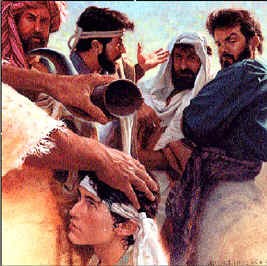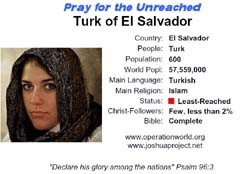OLD TESTAMENT READING- 1 SAMUEL 15:1-16:23
This is the lesson of 1 Samuel 15— God-glorifying worship requires full, not partial, obedience. 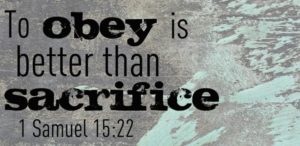
Partial obedience is disobedience. Disobedience is a form of rebellion. Rebellion is akin to divination or witchcraft. To think that one knows better than God is arrogance. It is arrogant to think that we can reinterpret His commands with our better ideas. It is a form of idolatry (1 Sam 15:23).
Mankind tends to rationalize his disobedience at the tree of knowledge of good and evil. We think it is sufficient to decide for ourselves what is good. The Word of God tells us that the flesh profits nothing. We resist that idea. But the ban of the cross rightfully condemns the entire Adamic nature, its self-righteous goodness as well as its badness!
John 6:63 63 “It is the Spirit who gives life; the flesh profits nothing; the words that I have spoken to you are spirit and are life.”
Isaiah 64:6b 6 All our righteous deeds are like a filthy garment;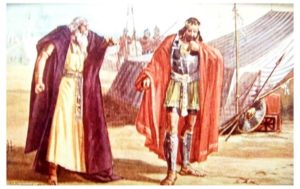
Saul was given instructions to be God’s instrument in punishing the Amalekites for what they did to Israel when they attacked their weaker members who straggled behind in the wilderness journey.
Deuteronomy 25:17-19 17 “Remember what Amalek did to you along the way when you came out from Egypt, 18 how he met you along the way and attacked among you all the stragglers at your rear when you were faint and weary; and he did not fear God. 19 “Therefore it shall come about when the LORD your God has given you rest from all your surrounding enemies, in the land which the LORD your God gives you as an inheritance to possess, you shall blot out the memory of Amalek from under heaven; you must not forget.
God’s instructions to Saul are clear. He is not to spare anything or anyone that belongs to Amalek. But Saul thinks he knows better. He spares King Agag and the best of the sheep and everything he considered good.
He rationalizes his disobedience. He thinks he was being obedient (1 Sam 15:20). His own excuse is a contradiction: “I completely destroyed Amalek and brought back Agag, their king.” If he brought back the king alive, he did not obey the Lord’s orders. The bleating of the sheep that Saul had spared also gave evidence of Saul’s disobedience.
Not only does Saul rationalize his disobedience, but so do the people with him (1 Samuel 15:9, 15). There is a lesson here. Even if Saul was being pressured by the will of the people to compromise obedience to the Lord, Saul is the appointed leader and he is held accountable.
Our sins have consequences. Saul admits his sin (15:30). He clutches and tears the hem of Samuel’s garment as Samuel starts to leave (15:27). Samuel explains that Saul’s actions are a prophetic picture of the consequences of his disobedience, saying, “The Lord has torn the kingdom of Israel from you today and has given it to one of your neighbors- to one better than you” (15:28).
God’s immutability is evident in the following statement from the prophet Samuel: “He who is the glory of Israel does not lie or change his mind; for he is not a man, that he should change his mind” (1 Sam 15:29).
Samuel reminds Saul of a principle that is repeated throughout the Bible:
1 Samuel 15:22 22 Samuel said, “Has the LORD as much delight in burnt offerings and sacrifices as in obeying the voice of the LORD? Behold, to obey is better than sacrifice, and to heed than the fat of rams.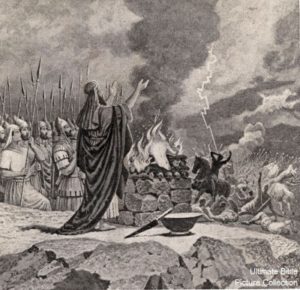
This teaching is repeated throughout the Bible, both in the Old and New Testament (Psalm 40:6-8; 51:16-17; Proverbs 21:3; Isaiah 1:11-17; Jeremiah 7:21-23; Hosea 6:6; Matthew 12:7; Hebrews 10:8-9).
Samuel was not discounting the form of worship commanded in Scripture. He emphasizes the primary force behind the form, which should be a reverential obedience from a heart that loves Him.
Our worship is hollow if we are compromising our obedience. Our praise is empty and our sacrifices in vain if they are not backed with the gracious activity of God’s love inspiring our full devotion to heeding His Word.
If we are compromising or neglecting obedience to God, our religious activity (church attendance, works of ministry, deeds of charity, serving on mission teams etc.), no matter how impressive, can be a cover up of our heart’s disconnect with the reality of God’s worthiness.
What Saul failed to do, Samuel did. He did not spare Agag. He pronounced a sentence of fair retribution upon Agag, saying, “As your sword has made women childless, so will your mother be childless among women.” Then Samuel put Agag to death before the Lord at Gilgal.
Both the Lord and Samuel are said to ‘grieve’ Saul’s disobedience and demise. This incident marks the last time that Samuel would ever see Saul.
In Chapter 16, David is anointed by Samuel in secret. He will not be publicly anointed and recognized until much later (2 Samuel 2:4, 5:3). Saul would be on the throne for many more years. Once again, we have the repetition of the pattern: first comes that which is natural; then comes that which is spiritual. First, the natural man is on the throne, then the spiritual man.
The years between David being anointed as king and not yet enthroned by the nation is a picture of Christ, who is born king (Matthew 2:2) and yet He is the despised and rejected by the established leaders (Isaiah 53:3).
David is considered the least likely candidate among the sons of Jesse, so that when Samuel asks to see Jesse’s sons, Jesse does not even bother to present David.
As Samuel reviews Jesse’s 7 sons, the Lord speaks to Samuel, saying, “The Lord does not look at the things man looks at. Man looks at the outward appearance, but the Lord looks at the heart” (1 Samuel 16:7).
Samuel presses Jesse to find out if he has any other sons. Jesse admits that his eighth son, his youngest, David, is tending his sheep. As David is brought before Samuel, the Lord says, “He is the one.”
David is privately appointed and anointed by Samuel in the presence of his brothers to be God’s chosen king for Israel. From that day onward, the Spirit of the Lord comes upon David in power.
David is anointed with the Spirit and is able to minister godly influence to others. In contrast, the Spirit of the Lord is said to have departed from Saul and instead, an evil spirit torments him. Saul’s attendants request that someone is sent to minister to Saul who can skillfully play the harp to alleviate Saul’s troubled spirit.
David, by this time, has a reputation as a musician and a brave man, and a warrior (1 Sam 16:18). One of the servants recommend David for the job, and he is recruited to be one of Saul’s armor-bearers and resident musician. He pleased Saul and became a welcome member of Saul’s household.
TODAY’S READING FROM THE NEW TESTAMENT- JOHN 8:1-20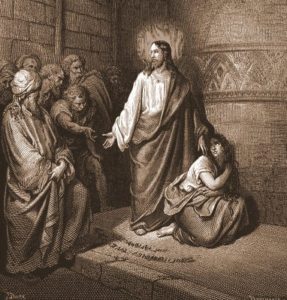
Verses 1 to 11 provide a wonderful illustration of Jesus’ ministry of grace.
A new day is dawning. Jesus descends from the Mount of Olives and appears again in the temple courts. The teachers of the Law and the Pharisees try to trap Jesus by bringing before him a woman caught in adultery. The Pharisees did not bring the man.
The law required that both parties to the adultery be stoned (Lev. 20:10; Deut 22:22).
The Jewish leaders were looking for a reason to bring Jesus to trial. They made the woman stand before the group and said to Jesus, “Teacher, this woman was caught in the act of adultery. In the Law Moses commanded us to stone such women. Now what do you say?”
If Jesus let the woman go, they would accuse Him of not upholding the Law of Moses. If He demanded that she be stoned according to the Law, they could accuse Him of rebelling against Roman law, which restricted the right to execute capital punishment to Roman authorities only (John 18:31).
Jesus bent down and started to write on the ground. This was a picture of the first giving of the Law, written on tables of stone by the finger of God (Exodus 31:18), the Law that contained the seventh commandment, “Thou shalt not commit adultery.” The 10 commandments, however, did not just condemn the woman caught in the act of adultery, but every human being.
James 2:10 10 For whoever keeps the whole law and yet stumbles in one point, he has become guilty of all.
Jesus is the finger of God, the author of the Law. After bending down, a picture of His humiliation in the Incarnation, and writing on the ground, a picture of His authority as the one who gave the commandments to Moses on tables of stone inscribed by His finger, He speaks to the woman’s accusers saying, “If any of you is without sin, let him be the first to throw a stone at her.” At this, he stooped down and wrote on the ground a second time. The accusing mob backed away one by one, the older ones being convicted first, and then the younger. Only Jesus was left with the woman standing before Him.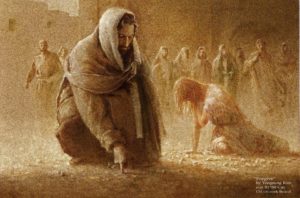
Jesus writing on the ground a second time is a picture of God writing the law once again after Moses broke the first tables of stone in light of the flagrant disobedience and idolatry of the people who were worshiping the golden calf while he was on the mountain. The Lord told Moses to get another tablet. This time the Law, written by the finger of God would be put inside the ark, a picture of the Law being fulfilled in the Testimony of Christ. He is the only One without sin who could rightfully cast the first stone executing judgment on the adulterous woman. Instead, Jesus stands as the One who takes the punishment that the woman deserves for her sin. He is her substitute and sheds His blood to atone for her sin. He alone can turn the Judgment Seat to a Mercy Seat. His blood upon the Mercy Seat above the ark of the covenant housing the Law, turns away God’s wrath and wins God’s pleasure on behalf of the repentant sinner.
His concluding words speak of the fruit of the Finished Work of Christ when it is believed: “Then neither do I condemn you, go and sin no more.” This command to ‘go and sin no more’ is the promise of a new nature that will be mediated to the believer when the Holy Spirit is given at Pentecost.
The command to ‘go and sin no more’ echoes the promise of a new life in the Spirit, one of the benefits of the New Covenant according to Old Testament prophecies.
Ezekiel 36:26-27 26 “Moreover, I will give you a new heart and put a new spirit within you; and I will remove the heart of stone from your flesh and give you a heart of flesh. 27 “I will put My Spirit within you and cause you to walk in My statutes, and you will be careful to observe My ordinances.
Jesus defends His testimony as “the light of the world,” affirming that it is witnessed by His Father and the written Word. The Pharisees, Jesus affirms, know neither the Father nor the Word.
TODAY’S PSALM- PSALM 110:1-7
This is an important Messianic Psalm. It is quoted or alluded to in the New Testament more than any other Psalm (Verse 1 is referenced in the New Testament 25 times and verse 4 five times).
As we have seen, Jesus used verse 1 to prove His deity (Matthew 22:41-46) and to answer the high priest during His trial (Matthew 26:24). Both Jesus and the Apostle Peter affirm that the author of this Psalm is King David. Since David was the highest ruler of the Kingdom, His lord (Adonai) must be the Lord Himself.
Psalm 110:1 1
The LORD says to my Lord (Adonai): “Sit at My right hand Until I make Your enemies a footstool for Your feet.”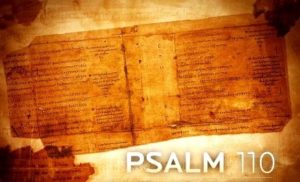
Jesus affirms His claim to deity, saying, “If David calls His son, His superior, His ‘Lord’, how is He his son?” (Matthew 22:45). Who else could the Promised Messiah, the Christ, the Son of David be, but the Lord God (Adonai) Himself? He is both the root and the offspring of David.
Verse 4 is referred to in the Book of Hebrews to demonstrate that Jesus has a greater priestly ministry than that of the Levites; an eternal priesthood through which He has made a once and for all perfect sacrifice.
Psalm 110:4 4 The LORD has sworn and will not change His mind, “You are a priest forever According to the order of Melchizedek.”
TODAY’S READING FROM PROVERBS
Proverbs 15:8-10 8 The sacrifice of the wicked is an abomination to the LORD, But the prayer of the upright is His delight. 9 The way of the wicked is an abomination to the LORD, But He loves one who pursues righteousness. 10 Grievous punishment is for him who forsakes the way; He who hates reproof will die.
PRAY FOR THE NATIONS
Republic of El Salvador
Latin America
Geography
Area: 21,041 sq. km
21,041 sq. km on the Pacific Coast of Central America. The smallest and most-densely populated Spanish-speaking mainland state in the Americas. Sub-tropical and susceptible to earthquakes.
Population: 6,194,126 Annual Growth: 0.44%
Capital: San Salvador
Urbanites: 61.3%
HDI Rank: 106 of 182 (UN Human Development Reports 2009)
Peoples: 13 (15% unreached) All peoples
Unreached Peoples Prayer Card
Official language: Spanish Languages: 7 All languages
Religion
Largest Religion: Christian
|
Religion |
|
Pop % |
Ann Gr |
|
5,861,501 |
94.63 |
0.4 |
|
|
1,960,405 |
31.6 |
4.5 |
Answer to Prayer
The consolidation of peace, stability, and democracy since 1992 is an answer to prayer after the intense suffering of civil war. Elections and economics now replace death squads and assassinations.
Challenge for Prayer
Rapid social and demographic shifts are changing the face of the country and require prayer and action. Most notable among them are the following:
a)The 3.3 million Salvadoreans living abroad, many in the USA. Their remittances sent home keep many out of poverty, yet they have spiritual needs of their own. Many are working illegally and are vulnerable to exploitation. Their absence has also triggered social shifts back home.
b)The new urban population. In one generation, El Salvador has gone from a predominantly agrarian, rural society to one in which 60% live in cities. This flow to the cities generates new challenges regarding infrastructure, crime, and poverty.
c)The large numbers of youth involved with the powerful maras. These gangs have attracted up to 70% of young men, partially orphaned by absent fathers. The Church finds that reaching the 15-30 age bracket is particularly difficult with its current methods. New methods must be adopted, or an unchurched generation will quickly emerge in El Salvador.
d)The massive megachurches, such as Elim and Tabernáculo Bíblico Bautista, both of which have grown from almost nothing to over 100,000 affiliates in their wider networks. With significant financial and political clout, these cell-based churches have the opportunity to powerfully and positively influence society.
PRAYER: Father, we praise You for our High King of heaven enthroned at Your right hand. Your Spirit is poured out upon us from our exalted head, Christ Jesus, our Lord. We want to please You in every detail and not compromise our obedience. Keep us from buckling under peer pressure or rationalizing our negligence to keep your Word. We thank You for the New Covenant of grace and that because of the blood of the Lamb, the perfect offering of Your Son as our substitute, the Judgment Seat has turned to a mercy seat, and we can come boldly into Your presence and receive grace to help in times of need. In Jesus’ Name. Amen.

